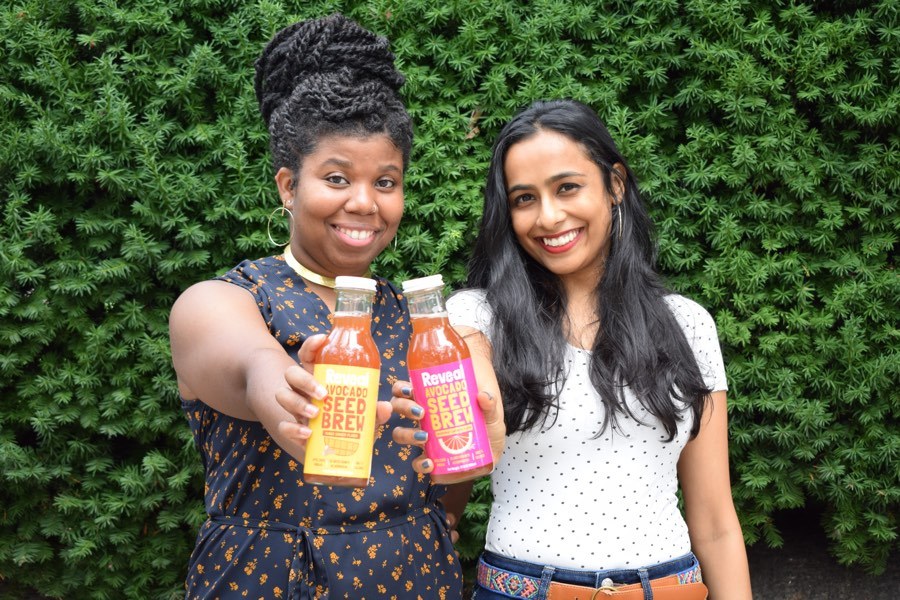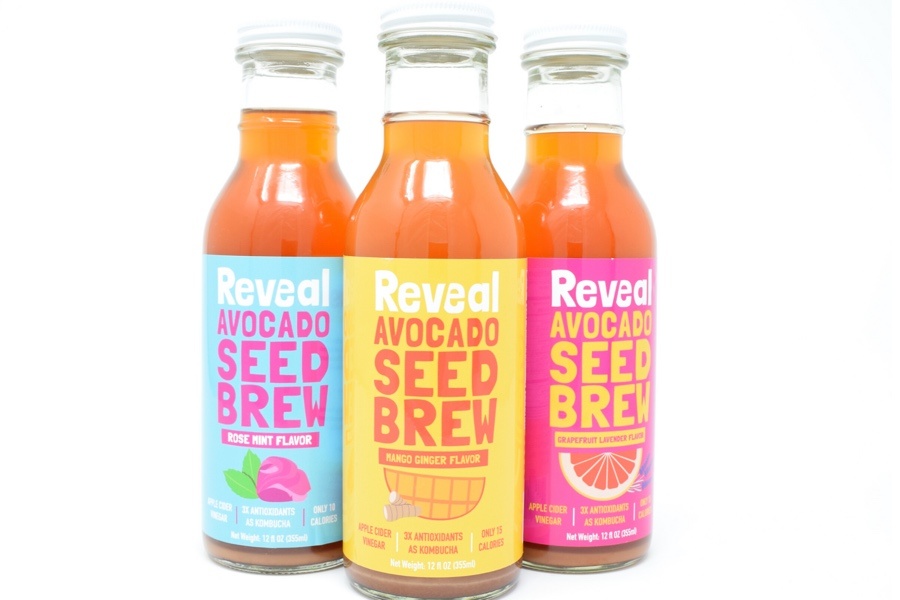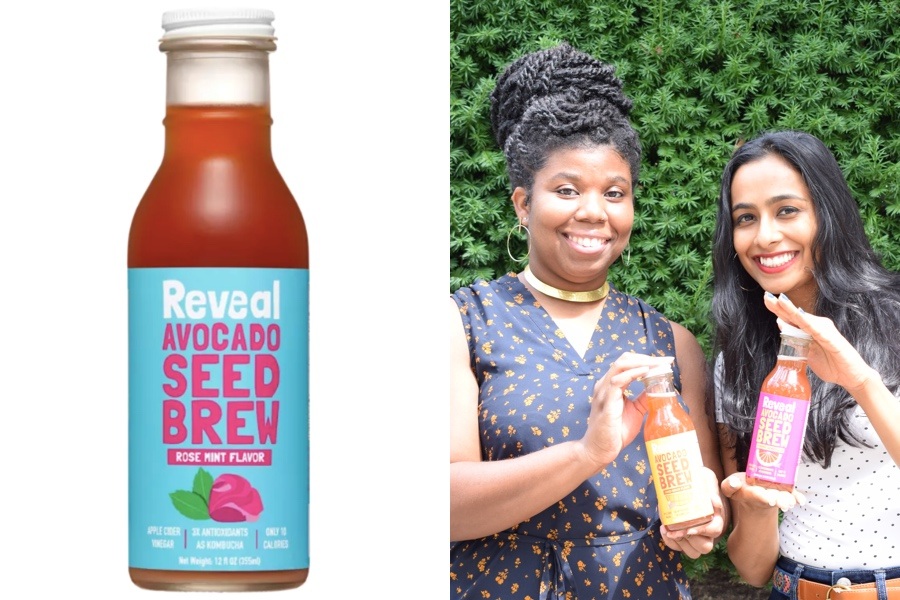Meet the Startup Founders Fighting Food Waste, One Avocado at a Time
Their new antioxidant-packed drink, Reveal, is the perfect zero-waste chaser to your avocado toast.

Zuri Masud and Sheetal Bahirat, the founders of Hidden Gems Beverage Company/Reveal avocado drinks. | Photo courtesy of Hidden Gems Beverage Company.
Sheetal Bahirat just wanted to make some guacamole — a lot of guacamole. “I had peeled and pitted an entire case of avocados,” she explains, “At the end of it I had a huge bowl of peels and seeds.”
For most people, this would not be a problem. Most would toss the contents of the bowl in the trash, and chalk the waste up to the cost of making the world’s greatest dip.
But, then again, most people are not food waste scientists.
“I thought, ‘If I throw this away, I’m the biggest hypocrite. I’m a food waste researcher!” Bahirat explains. “I started looking into what local restaurants and others were doing with avocado seeds. I learned that everyone throws them away. They don’t go into commercial compost bins because they’re too hard. I also found out that the seeds are full of antioxidants — more than half of antioxidants in an avocado are in the seed. That sounded like a massive waste.”
Bahirat started testing and researching at the Drexel Food Lab to figure out how she could extract those antioxidants. The best way turned out to be brewing them into a drink.

Reveal avocado seed brew comes in flavors like rose and mint, mango and ginger, and grapefruit and lavender. | Photo courtesy of Reveal
Bahirat teamed up with culinary scientist Zuri Masud, who shared similar food waste ideals, to take this idea from a spark to a reality. Together they formed Hidden Gems beverage company, a brand that’s dedicated to combatting food waste. Their first line of drinks, Reveal, is the world’s only antioxidant-rich beverage made from upcycled avocado seeds. Their company was incubated at Drexel’s Baiada Institute for Entrepreneurship, and the Reveal line launched on August 14th with an exclusive offering on goPuff. (They’ll be selling direct-to-consumer from their website this fall.)
The brewed avocado seed beverage boasts three times as many antioxidants as kombucha and green tea. It’s sugar-free and contains 15 calories. It comes in light, summery flavors like rose and mint, mango and ginger, and grapefruit and lavender. Each bottle includes two tablespoons of apple cider vinegar.
“The apple cider vinegar adds a nice flavor and health benefits from its probiotics,” says Masud, “It also acts as a natural preservative.”
The founders hope to change the way we look at our resources by inspiring Philadelphians to discover the hidden value in the food most people would normally call trash — especially in the coronavirus era, when trash is trending in Philly.
View this post on Instagram
To get their dream off the ground they first had to spend months experimenting with extraction methods — and get their hands on a ton of avocado seeds.
“First we were targeting people who manufactured avocado products, like avocado seed oil or guacamole,” Masud says, “But because we eat such a massive amount of avocados in this country, we quickly found that the scale which we could get them at was actually too large for us to handle right now. We chose to start with local restaurants to scale down.”
Masud and Bahirat, who both currently live in West Philly near Drexel’s campus, met with chefs and owners in Philly and New York to request the spent avocado seeds from their kitchens. The restaurants delivered, and then some.
The pair first collected seeds from Hungry Pigeon in Queen Village and High Street on Market in Old City, and then branched out further. Their list now includes Juno on Spring Garden, Rosy’s Taco Bar, and chain El Limon in the ‘burbs, as well as Tacombi and Avocaderia in New York. (They met with the New York restaurants when they were in the city working with the Food-X accelerator, which helps early-stage companies across the food supply chain.)
“Some people have the capacity to freeze them for us and some people don’t,” explains Masud, “We get them, clean them, and freeze them. When it’s time for us to make the batch we take them, brew them, and mix in our flavors and apple cider vinegar. We work out of a kitchen at Rutgers Food Innovation Center in New Jersey.”
“People helped us for no reason — just because we had an idea and they believed that this idea should exist as much as we did.”
“This whole city came together for us,” says Bahirat. “There was no reason for chefs to store their avocado seeds every day and train their staff to never throw them away, but they did that for us. People helped us for no reason — just because we had an idea and they believed that this idea should exist as much as we did.”
“The staff were surprised by the task, but everyone feels good about limiting waste,” says Josh Philips, the general manager at Juno, “It did get me thinking about how many avocado pits get thrown away. And saving the avocado pits is relatively easy. We process roughly 25 cases of avocados a week and most of that goes towards daily guacamole production, so we just have a special bin set up for pits, separate from other food waste.”
Once they’re finished with their brewing process Masud and Bahirat compost the seeds, making sure they make their way back into the ecosystem. These type of small systematic changes in the food industry over time could lead to major change in waste practices.
“Developing better food waste practices in restaurants is vitally important,” Philips added. That being said, there are some things that restrictions brought on by COVID-19 have improved for restaurants in that department: “One good thing about operating right now is that all of our business is done on a reservation basis,” says Philips, “This helps us manage our inventory and reduce a ton of waste.”
As a country, we waste approximately 30 to 40 percent of our food supply annually, according to estimates from the USDA. Our restaurants generate an estimated 22 to 33 billion pounds of food waste each year, according to the Natural Resources Defense Council (NRDC), which also found that American families throw out approximately 25 percent of the food and beverages they buy. The cost estimate of that waste is upwards of $1,365 annually for an average family. This takes place while other families don’t have enough food to eat — Philabundance reports that around 21% of the people in Philadelphia alone are food insecure.
“When food is wasted, so too is the land, water, labor, energy and other inputs that are used in producing, processing, transporting, preparing, storing, and disposing of the discarded food,” says the USDA website.
Even while most of us fear climate change, we’re still wasting food. According the EPA, food is the single largest category of material placed in municipal landfills, where it emits methane, a powerful greenhouse gas — contributing to the fact that municipal solid waste landfills are the third-largest source of human-related methane emissions in the country.
View this post on Instagram

Photography courtesy of Reveal
Bahirat, who had previously run a personal styling company in India, moved from Bangalore to Philly to study the problem of food waste — she focused her master’s thesis on the avocado seed. Masud had always been passionate about food, and a chef had directed her to the food science master’s program at Drexel.
“One of my professors, Jonathan Deutsch, connected me with people in the food waste industry. It was eye-opening,” says Masud, who recently completed a project with Aramark to open up a dining hall with solely vegan and vegetarian options.
Launching their company and first beverage this year, though, has been full of challenges: “Before COVID-19 we had planned to launch in retail,” says Bahirat, “We were doing tastings at events and local yoga and fitness studios. We had festivals lined up. Once the coronavirus happened, all of that was shut down. Grocery stores were focused on frozen foods and sanitation products, not the ready-to-drink beverage space. We had to pivot pretty quickly.”
They also had to contend with starting a business and seeking out investments as women of color — a challenge in general, but a particularly poignant one during America’s racial reckoning this summer.
“We’re young women of color so there are people who approach us from the gate like we’re under qualified, like we don’t know what we’re talking about,” says Masud, “And we certainly don’t know everything — but what we don’t know has nothing to do with us being women.”
“We’re young women of color so there are people who approach us from the gate like we’re under qualified, like we don’t know what we’re talking about,” says Masud, “And we certainly don’t know everything — but what we don’t know has nothing to do with us being women.”
“There are venture capital firms that pride themselves on ‘being the first check’,” explains Bahirat, “but we’ve found that in this process, a VC that participated in a multimillion dollar round for product development for a company similar to ours, feels we are still ‘too early.'”
And for Masud and Bahirat, it’s not just procuring that crucial seed funding (literally seed funding, in Reveal’s very organic case) that can be challenging — it’s balancing pursuing social justice with pursuing their dream.
“I didn’t expect to struggle so much with what it would personally mean to be minority women running a business. Everyone felt the impact of people’s response to the racial injustice displayed once again by the deaths of George Floyd and Breonna Taylor,” says Masud, “When protests were at their height in Philly, we were deciding whether we were going to write articles for our blog that day, make our routine phone calls — or go out in the streets and protest for something we believed in just as much as our business. And, at the same time, Sheetal has a phenomenal resume, track record and work experience, but still she has to prove to immigration services that she is important just to stay in this country.”
View this post on Instagram
But, the two are finding ways to move past these obstacles and forward with their ideas — and continue to try to stir up the industry-wide change they want to see.
“The truth is some of life’s realities impact some of us more than others, and processing a lot of these things takes mental, emotional, and physical energy,” says Masud, “It didn’t dawn on me that as minority business owners, just like a minority citizens, that we simply have to deal with things other people don’t have to.”
“But the upside is that we’ve realized the position that we’re in,” she continues, “We recognize the platform that we are creating can help change things in ways that could benefit people that look like us.”
Bahirat and Masud are already making a difference — and they’re just getting started. The names of both their company, Hidden Gems, and their line of drinks, Reveal, speaks directly to what they want to do to make changes in the culinary industry, as well as in people’s habits at home. (Here’s a guide to getting started composting in Philadelphia, and a local service that will pick up your compost for you if that sparks your interest.)
“Maybe this can apply other ingredients: pineapple skins or pineapple leaves or peach pits. There are so many options — a whole world waiting to be discovered.”
“Food waste prevention is something anyone can start in their own homes,” says Bahirat. “Being mindful, creative, and having ideas already in place for scraps and leftovers can save tons from the landfill — and put money back into your pocket. We have food waste tips on our blog. We’ve been working on our own ‘Food Waste Encyclopedia’ to help people figure out what they can do with their own hidden gems.”
“The idea is to prove out the concept that something once considered waste can be a valuable product. Instead of creating toxins in the landfill it can be valuable to the people drinking it, to the economy, and back to the environment because we compost the seeds afterward,” Bahirat adds, “Maybe this can apply to other ingredients: pineapple skins or pineapple leaves or peach pits. There are so many options — a whole world waiting to be discovered.”
“There is such potential for this to be replicated across the industry, and for people in their homes to take more notice of their own food waste. We’re essentially creating a supply chain for something that didn’t exist before. It will be a big deal,” says Masud. “Hopefully.”
Find out more about Hidden Gems Beverage Company/Reveal on their website, try the drinks on goPuff, or follow them on Instagram.
Want to hear more from us? Join Be Well Philly at:
FACEBOOK | INSTAGRAM | NEWSLETTER | TWITTER


